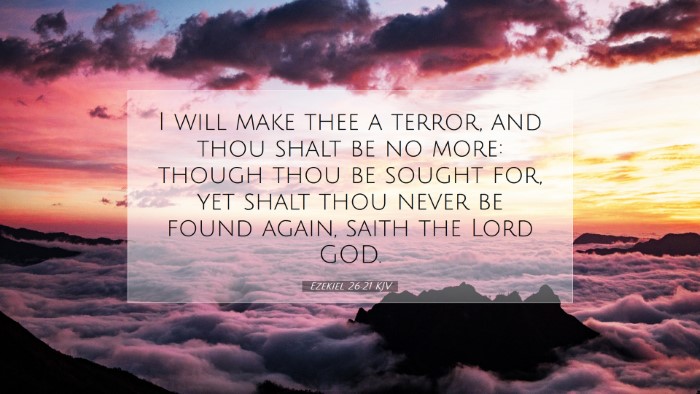Commentary on Ezekiel 26:21
Ezekiel 26:21 states: "I will make thee a terror, and thou shalt be no more: though thou be sought for, yet shalt thou never be found again, saith the Lord God."
This verse speaks to the complete and utter destruction of Tyre, a city that was once proud and imposing. It serves as a warning and a prophetic declaration from God through the prophet Ezekiel.
Contextual Overview
Understanding this verse requires grasping the historical and theological backdrop of the Book of Ezekiel. During the time of Ezekiel, the children of Israel were in exile, and the prophet was commissioned by God to address both the Israelites and surrounding nations, including Tyre, which was a stronghold of commerce and trade.
The Significance of Tyre
Tyre was renowned for its wealth, culture, and naval power. The city symbolized not just economic might but also a hub of idolatry and immorality, standing in stark contrast to the holiness of God. Thus, God's judgment upon Tyre serves dual purposes: cleansing the land of sin and showing His authority over all nations.
Theological Insights from Public Domain Commentaries
Matthew Henry's Commentary
According to Matthew Henry, this verse illustrates God's ultimate sovereignty over nations and cities. He notes that Tyre, despite its fortified position and extensive alliances, would not escape divine judgment. God’s declaration that Tyre shall be "no more" serves as a reminder of the transient nature of worldly power:
-
Divine Sovereignty: God's control extends beyond Israel to all nations, demonstrating that no power can stand against His will.
-
Call to Repentance: The destruction of Tyre serves as an admonition to all who oppose God, offering a chance for repentance before facing judgment.
Albert Barnes' Commentary
Barnes expands on the idea of terror and desolation as experienced by Tyre. His insights emphasize the certainty of God's word, as he interprets the phrase "though thou be sought for" as a warning that Tyre would be lost forever, never to regain its place. Key points from Barnes include:
-
Loss of Identity: The mention of Tyre being "sought" yet "never found" symbolizes the complete erasure of any trace of its former glory.
-
Judgment in Historical Context: The prophecy fulfilled during Nebuchadnezzar's siege asserts that God’s words are not just promises but also pronouncements of judgment.
Adam Clarke's Commentary
Adam Clarke provides a pastoral reflection on the implications of this verse, noting how God's judgments are not solely punitive but also serve as a divine teaching tool. His major thoughts include:
-
God's Justice: Clarke argues that the severity of God’s judgment is necessary to uphold His justice, thus providing moral clarity in a world filled with sin.
-
Lessons for the Faithful: The impending destruction should prompt self-examination among God’s people, encouraging them to align themselves with God's will and to avoid idolatry.
Application for Today
As we reflect on Ezekiel 26:21, several applications emerge for pastors, theologians, and students of the word:
-
Recognition of God’s Sovereignty: In a world where many seek power, wealth, and stability, we are reminded that true security lies in submission to God’s authority.
-
Call to Holiness: Just as Tyre faced judgment for its sins, contemporary believers are summoned to evaluate their lives for idolatry and immorality.
-
Hope amid Judgment: While God's judgments may be severe, they also indicate His commitment to justice, thus providing hope for ultimately redeeming His people.
-
Importance of Prophetic Voices: Today, prophetic voices within the church help guide believers, calling them back to fidelity to God amidst societal pressures.
Conclusion
Ezekiel 26:21 encapsulates a powerful message about divine judgment and the fleeting nature of human pride. By studying this verse and its commentaries, we gain insight not just into God's actions towards Tyre, but also the eternal truths that resonate throughout scripture. This serves as a clarion call to our generation, ensuring that we remain vigilant, humble, and committed to God's covenant.


